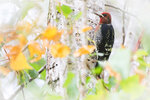




About two years ago, the publisher of The JOLT, Danny Stusser, had an idea. He thought his publication should include a column about birds and bird watching. Soon, we were meeting over lunch to talk about it.
I don’t know whether Danny realized it at the time, but he was riding the crest of a wave. In the past two years, there’s been a resurgence of bird watching (birding is the more current term) as a popular hobby. This is true across America, Europe, and probably other continents too. And birdwatching isn’t just for older white people anymore either; some of its most ardent fans, writers and photographers are young, middle-aged, and/or people of color.
Not surprisingly, this has led researchers to analyze what attracts people to birding.
The first explanation is that birds are our natural companions in this world. Everywhere we humans go, we see and hear birds. You cannot go out of your house here in Thurston County without encountering birds. And that’s true almost everywhere on earth.
Birds are our companions - I just love this thought.
Often people are not really aware that they live in a natural world. Urban living will do that to you as you’re surrounded by buildings and pavement, and you have the urge to keep busy. The benefits of connecting with the natural world are described well in a recent book, Better Living Through Birding. Its author, Christian Cooper, is a Black, gay man living in New York City; his description of finding respite from his urban existence in regular birding outings to Central Park is inspiring even to long-time birders.
A second benefit of paying attention to birds is that they are beautiful. Humans – all of us – need beauty in our lives and bird watching provides beauty free of charge, every day.
This may account for the popularity of binoculars. They literally magnify the beauty of every bird. I think that for many of us, this reason is hidden from our consciousness. We take in the beauty of birds the way we take in water or air, almost without realizing it. In this way, our need for aesthetic pleasure is satisfied just the way water satisfies our thirst.
We're both here year-around
And then, of course, there is bird song. After all, come springtime, as we venture outdoors, we will be surrounded by bird music. No one doubts that music is a universal human phenomenon – occurring in all cultures and continents. Philosophers who inquire about the origin of music often mention bird songs. There is almost certainly a primal human connection between bird song and music.
But here’s a big surprise, at least for me. In recent years, medical researchers have also been studying the beneficial effects of birding, and especially bird song, on human health. Not surprisingly, researchers confirm that contact with nature is consistently associated with better body and brain health. And it turns out birds and bird songs are of particular benefit.
This beauty will be returning in mid-February
One European study found that exposure to birds and bird song had a consistent beneficial effect in treating depression. Even severe cases that were treated by using headphones with bird song had positive impacts, not only on depression but also on feelings of anxiety, stress, and paranoia.
When I read this, my first response was, “Well, of course, birds sing in spring, and who doesn’t feel better in spring.” But this is serious research, and some of the studies include hooking up electronic monitoring thingies (neuroimaging studies) to the skull of study participants to evaluate the impacts of bird song on actual brain function.
None of the studies has demonstrated how bird song affects our brain, just that it does. Perhaps that explains birding’s resurgence of popularity – people under increasing stress have turned, almost without thought, to birding as a new socially acceptable form of “self-medication.”
I'll be singing in mid-April
I wonder whether there are other reasons that people of all ages and identities like watching birds.
But I suspect most of us don’t care why. We love bird watching and find that it gives us joy, and that’s quite enough.
George Walter is environmental program manager at the Nisqually Indian Tribe’s natural resources department; he also has a 40+ year interest in bird watching. He may be reached at george@theJOLTnews.com
Photos for this column are provided by Liam Hutcheson, a 16-year-old Olympia area birder and avid photographer.
2 comments on this item Please log in to comment by clicking here
Terrilovesanimals
I am right there with you! I think they help us so I love helping them I put fresh water out and make sure its clean and unfrozen! I love to see them enjoy it. I have posted in ND that we should do this and some people liked my suggestion and of course one neg. guy said something like "they have been around as long as we have so they can find their own water. Well I said, things have changed. So many little ponds have dried up or become so full of sludge and chemicals that they can't drink from it. AND, we used to drink out of wells! I love observing all the different kinds and the individual markings and sweet sounds they make. Thank you so much for this article and the pictures!
Friday, January 19 Report this
oldgar9
I have a small yard in Tumwater with a covered patio, I so love sitting out there watching the different birds come to my little space. So far I have seen Red Winged Blackbirds, hummingbirds, grosbeaks, Goldfinches, Juncos, sparrows, Red Breasted Nuthatches, Stellar's and Scrub Jays, Doves, Robins, House Finches, Towhees, and no doubt some I could not identify or have forgotten. Such a restful and enjoyable hobby is birding.
Wednesday, January 24 Report this